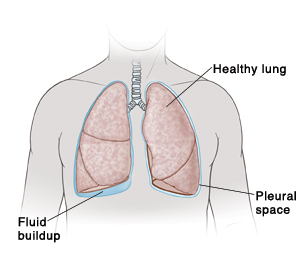Pleural Effusion
Pleural Effusion
Your healthcare provider has told you that you have pleural effusion. Pleural effusion means that you have extra fluid between the pleura. This area is called the pleural space. The pleura are 2 layers of thin, smooth tissue that surround the lungs and line the chest. The pleural space usually holds only a small amount of fluid. This fluid lubricates the pleura. But if too much fluid fills the space, it can make it hard or painful to breathe.
There are 2 types of pleural effusion:
Inflammatory. This is caused by a lung disease like pneumonia or lung cancer, both of which irritates the pleura.
Noninflammatory. This is caused by abnormal fluid pressures inside the lungs. The pressure can be caused by congestive heart failure (CHF). In CHF, extra fluid collects inside the lung tissues because of a weak heart muscle. This extra fluid then leaks into the pleural space. Other causes of noninflammatory pleural effusions include kidney disease, liver disease, and malnutrition.
What are the symptoms of pleural effusion?
The symptoms of pleural effusion include:
Sharp pains in the chest, especially when taking a breath, coughing, or sneezing
Trouble breathing
Cough
Fever
What are the causes of pleural effusion?
Common causes include:
Congestive heart failure
Cirrhosis of the liver
Pneumonia
Viral lung infection
Cancer
Blood clot in the lung (pulmonary embolism)
Heart surgery
Chest infections like pneumonia and heart disease are the most common causes. Less common causes include lung cancer.
How is pleural effusion diagnosed?
Your healthcare provider will examine you and ask about your health history. Tests include:
Blood tests
Analysis of fluid in pleural space, chest X-ray, CT scan, or ultrasound
How is pleural effusion treated?
The extra fluid may be drained from the pleural space. This is done with a procedure called thoracentesis. This procedure uses a thin needle to draw out the fluid from the pleural space. In some cases, a tube is placed in the chest to drain the extra fluid. The tube will likely stay in place for several days.
You may have other treatments, depending on the cause of your pleural effusion. If it’s because of a bacterial infection, you will be given antibiotics to fight the infection. If it’s because of a heart condition, you will be given medicines and other treatment for your heart. Your healthcare provider can tell you more about the cause of your pleural effusion and your treatment choices.
What are the long-term concerns?
If untreated, pleural effusion can lead to serious health problems, such as collapsed lung from fluid filling the pleural space.
Call 911
Call 911 if you have:
Trouble breathing
Worsening chest pain
When to call your healthcare provider
Call your healthcare provider right away if you have:
Continued coughing
Fever
Updated:
September 02, 2017
Sources:
Diagnostic Evaluation of a Pleural Effusion in Adults: Initial Testing. UptoDate.
Reviewed By:
Blaivas, Allen, J., DO,Sather, Rita, RN
